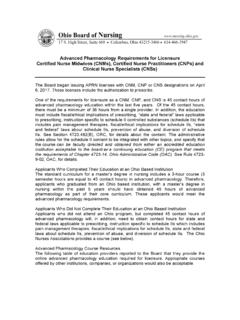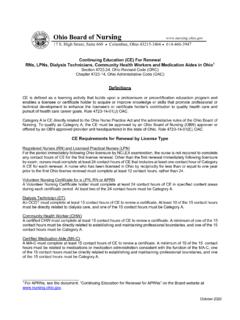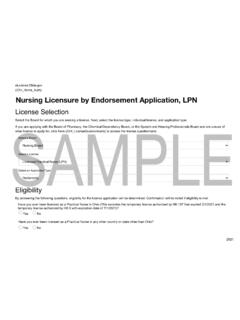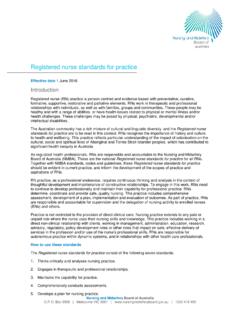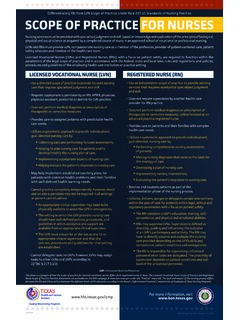Transcription of Scopes of Practice: Registered Nurses (RNs) and Licensed ...
1 October 2019 1 Scopes of Practice: Registered Nurses (RNs) and Licensed Practical Nurses (LPNs) This document is to provide guidance regarding the Scopes of practice for RNs and LPNs based on the requirements in the Nurse Practice Act (NPA) and administrative rules. The Nurse Practice Act and administrative rules can be found on the law and rules page of the Board website at Section , Ohio Revised Code (ORC), specifies Scopes of practice for RNs and LPNs. Chapter 4723-4, Ohio Administrative Code (OAC), specifies RN and LPN standards of practice, and addresses patient safety and the nursing process. Registered Nurses Section (B), ORC, defines the scope of RN practice as: Providing to individuals and groups nursing care requiring specialized knowledge, judgment, and skill derived from the principles of biological, physical, behavioral, social, and nursing sciences.
2 Such nursing care includes: (1) Identifying patterns of human responses to actual or potential health problems amenable to a nursing regimen; (2) Executing a nursing regimen through the selection, performance, management, and evaluation of nursing actions; (3) Assessing health status for the purpose of providing nursing care; (4) Providing health counseling and health teaching; (5) Administering medications, treatments, and executing regimens authorized by an individual who is authorized to practice in this state and is acting within the course of the individual s professional practice; (6) Teaching, administering, supervising, delegating, and evaluating nursing practice. RNs have independent Licensed authority to engage in all aspects of practice specified in Section (B), ORC, except that, when providing nursing care pursuant to Section (B)(5), ORC, the RN must have an order from an individual who is authorized to practice in this state and is acting within the course of the individual's professional practice for administration of medication or treatments or for the regimen that is to be executed.
3 Rule 4723-4-03(D), OAC. The RN determines the data to be collected to "assess the patient s health status for the purpose of providing nursing care," as identified in Section (B)(3), ORC. Assessing health status is further defined in Section (D), ORC, as the collection of data through nursing assessment techniques, which may include interviews, observation, and physical evaluations for the purpose of providing nursing care. October 2019 2 Based on the health status assessment RNs determine the nursing care needs of the patient and the resulting nursing regimen that will be executed in accordance with Section (B)(2), ORC. Nursing regimen is defined in Section (C), ORC, in that it may include preventative, restorative, and health-promotion activities. The definition of patient, set forth in Rule 4723-4-01(A)(4), OAC is the recipient of nursing care, which may include an individual, a group, or a community.
4 Therefore, the nursing regimen determined by RNs is not limited to individual patients, but may be established for specific populations or defined groups. Rule 4723-4-03, OAC, provides further information about the implementation of the nursing regimen and the standards of RN practice. RN Role/Nursing Process The following examples of RN practice are in the NPA and administrative rules. The RN: Collects patient health data from patient, patient family, and LPN or other health care providers. Analyzes data to determine nursing regimen. Establishes, accepts, or modifies a nursing diagnosis or problem. Implements and communicates the plan of nursing care. Evaluates and documents the patient s response to the nursing care. Reassesses and revises the nursing plan of care as appropriate.
5 Licensed Practical Nurses Section (F), ORC, defines the scope of LPN practice as Providing to individuals and groups nursing care requiring the application of basic knowledge of the biological, physical, behavioral, social, and nursing sciences at the direction of a Registered nurse or any of the following who is authorized to practice in this state: a physician, physician assistant, dentist, podiatrist, optometrist, or chiropractor. Such nursing care includes: (1) Observation, patient teaching, and care in a diversity of health care settings; (2) Contributions to the planning, implementation, and evaluation of nursing; (3) Administration of medications and treatments authorized by an individual who is authorized to practice in this state and is acting within the course of the individual s professional practice, except that administration of intravenous therapy shall be performed only in accordance with section or of the Revised Code.
6 Medications may be administered by a Licensed practical nurse upon proof of completion of a course in medication administration approved by the board of nursing. (4) Administration to an adult of intravenous therapy authorized by an individual who is authorized to practice in this state and is acting within the course of the individual s professional practice, on the condition that the Licensed practical nurse is authorized under section or of the Revised Code to perform intravenous therapy and performs intravenous therapy only in accordance with those sections; (5) Delegation of nursing tasks as directed by a Registered nurse; (6) Teaching nursing tasks to Licensed practical Nurses and individuals to whom the Licensed practical nurse is authorized to delegate nursing tasks as directed by a Registered nurse.
7 October 2019 3 LPNs have a "dependent" practice, which means the LPN is authorized to practice only when the practice is directed by a Registered nurse or any of the following who is authorized to practice in this state: a physician, physician assistant, dentist, podiatrist, optometrist or chiropractor (Section (F), ORC). The direction required for LPN practice is further defined as communicating a plan of care to a Licensed practical nurse in Rule 4723-4-01(B)(6), OAC. A physician, physician assistant, dentist, podiatrist, optometrist or chiropractor, or the RN may provide LPNs verbal or written direction of the plan that each of these health care providers have established for the patient. LPNs are authorized to execute the plan in accordance with the standards of LPN practice in accordance with Rule 4723-4-04, OAC.
8 When the RN communicates the plan of care to the LPN, it may be verbally, in the form of an established nursing plan of care, or both. Rule 4723-4-04, OAC, further explains that the direction provided by RNs to LPNs about nursing practice is not meant to imply the RN is supervising the LPN in the employment context. The LPN is accountable to identify the RN or other authorized health care provider who is directing the LPN s practice. Otherwise, the LPN may be engaging in practice beyond the LPN authorized scope. LPN Practice Prohibitions The following are specific LPN practice prohibitions contained in the NPA and rules: Engaging in nursing practice without RN or authorized health care provider direction. Administering IV push medications (IV medications other than Heparin or Saline to flush an intermittent infusion device).
9 Teaching the practice of nursing. Supervising and evaluating nursing practice. Assessing health status for purposes of providing nursing care. The LPN contributes to all steps of the nursing process by communicating with the RN or the directing authorized health care provider concerning the patient s status and needs. When a RN is directing LPN practice, it is the RN who establishes the nursing regimen and communicates the nursing practice needs of the patient. LPN Role/Nursing Process The following are examples of LPN practice in the NPA and administrative rules. The LPN: Collects and documents objective and subjective data and observations about the patient. Contributes observations and health information to the nursing assessment and reports all data to the RN or authorized directing health care provider.
10 Implements the current plan of nursing care at the direction of the RN, or the medication or treatment authorized by the directing physician, physician assistant, dentist, podiatrist, optometrist or chiropractor. Documents the patient s response to the nursing plan of care or the medication or treatment. Contributes to the revision of the nursing plan of care. Contributes to the evaluation of the patient s response to the plan of care through documentation and verbal communication with other members of the health care team. LPN IV Therapy Chapter 4723-17, OAC, addresses LPN IV therapy for the LPN who is IV therapy certified. The Chapter defines terms, IV therapy procedures IV therapy certified LPNs may perform, and IV therapy procedures that LPNs are prohibited from performing.





